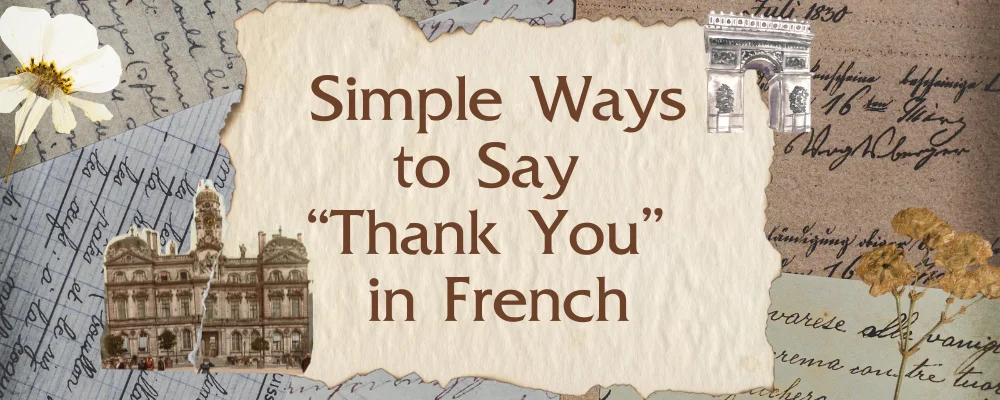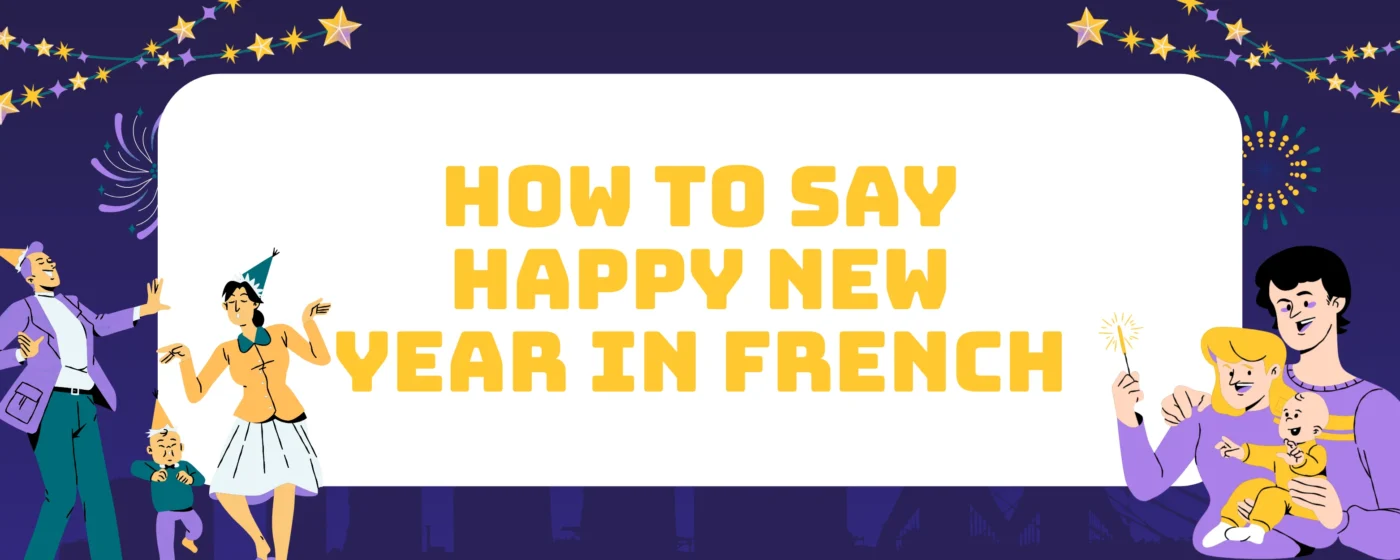Expressing gratitude transcends language barriers. In French-speaking settings, mastering phrases like “merci” not only enhances communication but also demonstrates your knowledge of cultural sensitivity and deepens understanding. Let’s dive into this list and embrace these expressions to build stronger relationships and navigate French culture with grace.
Key Takeaways
- Learn different simple ways to say “Thank you” in the French language and know the informal and formal ways of “Thank You”.
- There is a word, Merci, which is the easy everyday one, bump it to merci beaucoup or un grand merci for extra thanks.
- Learn how Ahead-of-time, thank you, such as merci d’avance for emails, or merci pour tout when someone’s done a lot.
- Know the personal touch words, such as merci mon ami(e) for pals, je te remercie for close ones, or pass it on with remerciez-le de ma part.
- Learn fun slang of the thank you, such as cimer, trop merci, merci bien, keep it chill with friends or texts!
Formal Ways to Say Thank You in French
Merci
Translation: Thank you
‘Merci’ is the most simple, yet versatile way of saying ‘thank you’ in French. It is widely used in casual settings and also acceptable in formal ones when accompanied by polite phrasing. It can also be used in formal settings, though it might be accompanied by additional polite phrases to convey a higher degree of gratitude.
You can use ‘Merci’ when a waiter brings you your food.
Example: Merci, c’était délicieux !
(Thank you, it was delicious!)
Merci beaucoup
Translation: Thank you very much
The expression ‘Merci beaucoup’ is the most common way of saying ‘thank you very much’ in French. ‘Merci beaucoup’ is versatile and can be used in most situations where you want to express a significant level of thanks, appropriate in both casual and moderately formal situations.
You can use ‘Merci beaucoup’ when someone offers you a seat in a crowded bus.
Example: Merci beaucoup pour votre aide !
(Thank you very much for your help!)
Un grand merci
Translation: A big thank you
‘Un grand merci’ conveys a more significant level of gratitude than a simple ‘Merci’. ‘Un grand merci’ is appropriate in situations where you want to express more than just a basic “Thank You”.
It’s apt to use ‘un grand merci’ when a neighbour kindly offers you help to move into your new house.
Example: Un grand merci pour tout ce que vous avez fait.
(A big thank you for everything you’ve done.)
Merci du fond du cœur
Translation: Thank you from the bottom of the heart
‘Merci du fond du cœur’ conveys the English equivalent ‘thank you with all my heart’. It signifies a deep, sincere, and profound sense of gratitude. It’s a great expression to utilise in emotional, heartfelt or meaningful situations.
You can use this when someone has consistently been there for you through thick and thin!
Example: Merci du fond du cœur pour ton soutien constant.
(Thank you from the bottom of my heart for your constant support.)
A similar phrase is ‘merci de tout coeur’, which also expresses deep, heartfelt gratitude in French and can be used in both casual and formal contexts.
Mille mercis
Translation: A thousand thanks
‘Mille mercis’ conveys a sense of abundant and heartfelt gratitude. The use of ‘mille’ adds a touch of poetic flair and emphasizes the magnitude of appreciation. ‘Mille mercis’ is perfect for situations where you want to express a significant amount of gratitude with a touch of warmth and sincerity.
You can use it to thank a friend who organised your birthday party to surprise you!
Example: Mille mercis pour cette soirée incroyable !
(A thousand thanks for this amazing evening!)
Another emphatic way to express gratitude is ‘merci mille fois,’ which is similar to saying ‘thanks a million’ in English. Both phrases are used in both formal and informal contexts to show deep appreciation for significant acts of kindness.
Merci d’avance
Translation: Thank you in advance
The polite French expression meaning ‘thank you in advance’ is ‘Merci d’avance’. It’s used when you are asking someone to do something for you and you want to thank them beforehand for their anticipated action. It implies that you are confident they will fulfill your request.
You can end your email with ‘merci d’avance’ when you’re emailing a colleague to ask for feedback on a document.
Example: Merci d’avance pour votre retour.
(Thank you in advance for your response.)
Merci mon ami(e)
Translation: Thank you, my friend
‘Merci mon ami(e)’ is a friendly way to thank someone close. This expression is perfect for expressing heartfelt thanks to close friends, peers, or anyone with whom you share a friendly and informal relationship. It conveys a sense of warmth, affection, and personal connection along with your gratitude.
In informal settings, you can also use ‘merci à toi’ (thanks to you) to reciprocate thanks, or include ‘à toi’ in phrases like ‘c’est très gentil à toi’ (that’s very kind of you) to acknowledge someone’s kindness directly.
You can use ‘merci mon ami’ when a friend brings you soup when you’re sick.
Example: Merci, mon amie, tu es la meilleure.
(Thank you, my friend, you’re the best.)
Je te remercie
Translation: I thank you
This expression indicates that you are consciously acknowledging the other person and their action. You can use this when your neighbor helps you carry groceries to your door. Example: Je te remercie de m’avoir aidé aujourd’hui.(I thank you for helping me today.)
Another way to express gratitude in French is with the phrase être reconnaissant(e), which means “to be grateful.” It is often used with prepositions like pour (for something), de (for having done something), or envers (towards someone) to specify what or who you are grateful for.
Remerciez-le/la de ma part
Translation: Thank him/her on my behalf
This phrase expresses indirect gratitude and is suitable in situations where you are asking a third person to convey your thanks to someone else.
You can use this to convey your gratitude when you receive a gift from a relative who couldn’t attend your event.
Example: Remerciez-la de ma part pour ce beau cadeau.
(Thank her on my behalf for the lovely gift.)
Merci pour tout
Translation: Thank you for everything
It conveys a comprehensive sense of gratitude for all that someone has done. It’s used in situations where you want to express appreciation for a wide range of actions, support, or kindness. It’s suitable when someone has significantly helped you or been there for you in many ways.
You can use this to express appreciation and gratitude when you’ve stayed with friends for a week and they’ve taken great care of you.
Example: Merci pour tout, je me suis senti comme chez moi.
(Thank you for everything, I felt right at home.)
Expand your professional language skills with this detailed guide on essential Business French Vocabulary for workplace communication and client interactions.
Slang & Informal Ways to Say “Thank You” in French
Cimer
Translation: Thanks (verlan/slang)
A reversed-syllable version of merci, commonly used in casual conversations among friends.
Example: Cimer pour le coup de main !
(Thanks for the help!)
Merci bien
Translation: Thanks a lot / Much obliged
Polite and a bit old-fashioned, if said with a flat or exaggerated tone, it may sound sarcastic. Still used in everyday speech.
Example: Merci bien pour l’info.
(Thanks a lot for the info.)
Trop merci
Translation: Thanks so much
An enthusiastic, trendy way to express gratitude—common in texts, speech, or social media.
Example: Trop merci pour le cadeau, c’est adorable !
(Thanks so much for the gift, it’s adorable!)
Merci infiniment
Translation: Thank you endlessly / Thanks a million
Elegant and heartfelt—not really slang, but a beautiful way to show deep appreciation in emotional or formal contexts.
Example: Merci infiniment pour votre aide précieuse.
(Thank you endlessly for your valuable help.)
To easily achieve French fluency and master more such nuances, you can explore the immersive courses offered by La Forêt French Class or indulge in the informative French Language Learning Blog articles.
Lost for Words? We’ve Got You!
Sign up for our courses and let our expert teachers boost your vocabulary effortlessly!
Responding to Thank You in French
In French, responding to someone’s gratitude is just as important as expressing it. The most common and informal way to say “you’re welcome” is “de rien,” which you’ll hear in everyday conversations among friends and acquaintances. In more formal situations, or when you want to show extra politeness, you can use “je vous en prie,” which is a gracious and respectful way to respond.
Another polite option is “il n’y a pas de quoi,” meaning “don’t mention it,” which works well in both formal and informal contexts. If you want to keep things light and friendly, “pas de problème” (no problem) or “c’est normal” (it’s normal) are also frequently used.
In some cases, especially when you want to reciprocate the gratitude, you might say “je vous remercie beaucoup” to express your own thanks in return. Choosing the right response shows your understanding of French etiquette and helps you engage more naturally in conversations.
Enhance your vocabulary with these 10 ways to say “Good Luck” in French in everyday conversations and cultural settings.
Frequently Asked Questions
1. Is merci beaucoup polite?
Ans: Yes, “merci beaucoup” is polite and a very common way to say “thank you very much” in French. It’s generally appropriate in most everyday situations.
2. How do people say ‘thanks’ in Paris?
Ans: ‘Thanks’ in Paris is most commonly said as “merci”. It’s the standard and most widely used way to express gratitude in French, including in Paris!





